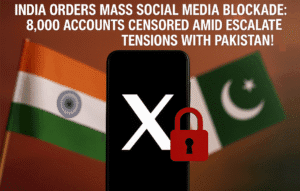India Orders Mass Social Media Blockade: 8,000 Accounts Censored Amid Escalating Tensions with Pakistan!
India has ordered the blocking of over 8,000 accounts on X (formerly Twitter) amid escalating tensions with Pakistan, citing national security concerns. The Indian government’s directive, which threatens fines and imprisonment for non-compliance, has drawn criticism from X for its lack of transparency. While the company adhered to the order, it expressed concerns about the opaque nature of the request, highlighting the risks to free speech and accountability.
The crackdown comes amid military strikes and regional blackouts in response to Pakistan’s actions, raising alarms about censorship during crises. Digital rights groups argue the move sets a dangerous precedent for arbitrary enforcement. With elections approaching, the government faces pressure to control narratives around the conflict. Critics fear the suppression of dissent and humanitarian communication, as India continues to tighten its digital governance laws. This incident highlights the tension between security measures and civil liberties, with growing resistance from tech companies.

India Orders Mass Social Media Blockade: 8,000 Accounts Censored Amid Escalating Tensions with Pakistan!
In a sweeping move, the Indian government has mandated the blocking of over 8,000 accounts on social media platform X (formerly Twitter), citing national security concerns amid heightened military tensions with Pakistan. The directive, issued under India’s internet laws, threatens hefty fines and potential imprisonment for X’s staff if non-compliant. The company, while adhering to the order, has openly criticized the lack of transparency and due process in the government’s demands.
X’s Compliance and Critique
X’s Global Government Affairs team confirmed the blocks, emphasizing the action applies only within India. The affected accounts reportedly include international journalists, news outlets, and public figures. Notably, the government provided limited justification for most takedowns, failing to specify which posts violated laws or share evidence.
“We disagree with these directives, but withholding the accounts is our only recourse to ensure continued service in India,” X stated. The platform stressed the importance of maintaining information access during crises but lamented legal restrictions preventing full disclosure of government orders. “Opacity undermines accountability and risks arbitrary enforcement,” the company added, hinting at broader concerns over digital rights and censorship.
Security Context: Regional Blackouts and Cross-Border Strikes
The crackdown coincides with reports of Pakistan targeting Indian military sites, including Jammu airport, prompting widespread emergency measures. On Thursday night, cities in Gujarat, Punjab, and Jammu & Kashmir enforced total blackouts—a common security protocol during heightened alerts. Sirens echoed across border regions like Uri and Rajouri, while airlines issued advisories rerouting flights away from conflict zones.
India has historically imposed internet shutdowns during unrest, particularly in Jammu & Kashmir, citing counterterrorism needs. Critics argue such measures stifle dissent and humanitarian communication. The latest blocks on X, however, mark an unprecedented scale, raising alarms among free speech advocates.
Balancing Security and Transparency
The government has yet to publicly detail its rationale for the mass blocks, though sources suggest efforts to curb “misinformation” and “panic” during military operations. Digital rights organizations like Access Now condemn the move as overreach. “Shutting down voices without explanation sets a dangerous precedent,” said a representative.
X’s dilemma reflects a global challenge for tech firms navigating authoritarian-leaning policies. India, a key market with over 700 million internet users, has tightened social media regulations in recent years, requiring platforms to appoint local compliance officers and adhere to rapid takedown mandates.
Broader Implications
The incident underscores the fragile balance between national security and civil liberties. While the government prioritizes stability, critics warn that opaque censorship erodes trust and hampers crisis response. As blackouts persist and online discourse narrows, residents in affected regions face heightened isolation during a volatile geopolitical moment.
Analysts speculate the blocks aim to control narratives around Pakistan’s strikes and India’s retaliation. With elections looming in 2025, the ruling party faces pressure to project strength amid border skirmishes. However, the lack of accountability mechanisms for such orders leaves room for abuse, observers note.
Looking Ahead
As tensions simmer, the spotlight remains on India’s digital governance framework. X’s resistance—albeit procedural—highlights growing corporate pushback against unilateral censorship. Meanwhile, users increasingly turn to VPNs and encrypted platforms to bypass restrictions, illustrating the cat-and-mouse game between state control and digital resilience.
For now, the blackouts and blocked accounts signal a nation bracing for conflict, even as questions about transparency and rights linger unanswered.
You must be logged in to post a comment.